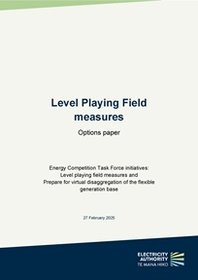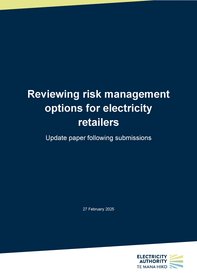Level playing field measures
Consultation
Thanks to all those who engaged with this consultation. We will consult on the draft Code changes necessary to introduce these mandatory non-discrimination obligations in October 2025. We are now seeking feedback on the proposed Code amendments to make these changes.
This consultation sought feedback on a proposal to introduce a new electricity industry rule called ‘mandatory non-discrimination obligations’ that the four large gentailers - Genesis, Contact, Meridian and Mercury – would have to follow.
This new rule would prevent the gentailers from giving preferential treatment to their retail arms for hedge contracts. Instead, they would have to make these contracts available to all industry participants on effectively the same terms as they use when trading internally. This would ‘level the playing field’ so independent retailers and generators can better compete with the gentailers.
This would give New Zealanders increased competition and ultimately give electricity customers more choices and lower power prices.
Our risk management review findings form an important evidence base for our level playing field measures work.
How to have your say
Electricity consumers are invited to read our guide and share your feedback by completing the survey on pages 5 and 6 of the guide.
Surveys can be:
- digitally completed or scanned and emailed to levelplayingfield@ea.govt.nz
- printed and sent to the Electricity Authority, PO Box 10041, Wellington 6143. (Mail must be post-marked on or before the closing date.)
You can also provide verbal feedback. Please email levelplayingfield@ea.govt.nz or call 04 460 8860 to arrange.
Industry participants and anyone wanting to provide more detailed information about our proposal are invited to read the options paper and complete the submission form.
Overview for consumers
Our proposed approach
We propose to introduce a three-step progressive approach. If the first step proves insufficient, the Authority could then impose other more prescriptive ways of levelling the playing field.
The steps are:
Step 1: Principles-based non-discrimination requirements.
Step 2: Non-discrimination requirements set out in detail.
Step 3: All gentailer-supplied hedge contracts must be traded through a regulated market, on equal terms for all buyers.
What is flexible generation?
Flexible generation is electricity generation that can quickly ramp up or down production on demand, enabling it to respond to the need for power at any given time.
Examples include hydroelectricity and thermal (gas and coal fuelled) power. Battery storage systems are also flexible. They provide flexibility to manage fluctuations in electricity supply due to variable renewable sources like wind and solar.
What is an electricity hedge contract?
An electricity hedge contract is a contract between two parties who are both exposed to volatile electricity spot prices. Typically, one buys at spot prices, and one sells at spot prices. The hedge contract between the parties reduces their net exposure to price volatility. For example, an independent retailer or large industrial electricity consumer might hedge with a gentailer.
Why do hedge contracts matter?
Hedge contracts matter because they support the financial viability of new independent retailers and generators in the electricity sector. For retailers, hedges provide insurance against very high spot prices. For new generators, hedges better enable them to enter into power purchase agreements (PPAs) with large users, which secures them a long-term revenue stream, opening up access to construction finance for new electricity generation projects.
Hedges are critical to enabling competition, which will get more power into the system, provide more choice to consumers and put downward pressure on electricity prices. The gentailers control the flexible generation that backs these hedges.
What would the impact on consumers be?
Households and businesses would benefit from increased competition in the retail electricity market, and an increased supply of wholesale electricity. More electricity supply and more competition will lead to consumers having more choices and downward pressure on power prices over the longer term.
How long before we see these benefits?
The first step of the changes we are proposing could be in place this year (subject to feedback). We expect that independent generators and retailers would take immediate confidence from such a change. We expect that confidence to flow through to innovation in the marketplace
Options paper
We want to boost competition in the electricity market by levelling the playing field between the four large generators with retail arms (the gentailers) and independent generators and retailers.
We’re seeking feedback on an options paper that supports the Energy Competition Task Force’s level playing field initiatives.
Q&A guide
Check out our Q&A guide to understand what we're proposing and why.
If you have any other questions, feel free to contact us at levelplayingfield@ea.govt.nz
Ask us about our level playing field measures proposal
Contact us at levelplayingfield@ea.govt.nz
Consultation questions answered
We answered the following questions during this consultation.
1. How will you quantitatively measure the success of the new obligations?
We have not developed a detailed monitoring approach for the preferred measures set out in our options paper. However, we can make the following comments:
- The proposed non-discrimination obligations for the four large generator-retailers are seeking to promote three outcomes for hedge contracts - liquidity, competitive prices and even-handedness. If the proposed obligations are put in place, we would expect to monitor each of these outcomes and assess progress (to the extent possible).
- Some outcomes will be more straight forward to monitor and assess than others. For example, we would expect that monitoring (amongst other things) changes in offered volumes and traded volumes for shaped hedges would provide a useful indicator of liquidity. By contrast, assessing whether shaped hedge pricing is competitive is more difficult (this is discussed in the Reviewing risk management options for electricity retailers - issues paper).
- We would expect to monitor trends in the market that are indicative of increased competition, e, what improved outcomes for hedge contracts should contribute to. For example, we would continue to monitor concentration in the retail market.
- We expect this level playing field initiative, if implemented, will put increased downwards pressure on retail prices. But we do not have a specific year on year target for retail prices, and note that many other factors contribute to retail pricing (including network charges and fuel scarcity).
We welcome any feedback on how you consider that the success of this proposed initiative should be monitored.
2. How will you maintain and enforce this?
Question
It feels like the weakness in this approach will be enforcement. It is a similar solution to the supermarkets and their wholesale businesses.
So far as we can tell, that hasn’t had much impact on the industry so far and there have been plenty to suggestions that it isn’t working as planned.
The Commerce Commission has proven itself unable to maintain competitive markets across a whole range of sectors. How will the EA be different?
Answer
The progressive non-discrimination obligations proposed in the Level playing field measures – Options paper are designed (if they are put in place) to provide the right incentives to the four large gentailers to meet their obligations at the first step.
For example, there is a proposed requirement for gentailer’s directors to certify compliance with the non-discrimination obligations. If the gentailers don’t meet those obligations, as well as being able to seek a penalty for breach of the Electricity Industry Participation Code, the Authority has proposed a clear escalation path to stronger, more prescriptive regulatory options as needed.
This clarity on further potential measures is intended to provide the industry, and current and potential investors, with a degree of regulatory certainty about the strength and nature of the additional regulation being considered.
You have made a comparison to the grocery competition regime administered by the Commerce Commission. However, the grocery regime does not at this point require non-discriminatory terms – the current grocery regulation is lighter-handed than that. The Commission commenced a grocery wholesale supply inquiry in September 2024 with the intent of considering whether to introduce stronger regulation.
3. How can you be confident generators have the appropriate incentives to substantially invest in new capacity?
Question
How can the EA be confident generators have the appropriate incentives to substantially invest in new capacity?
Informed commentary points out that in fact the opposite incentive exists. Generators have every reason to keep supply tight, to take advantage of the higher clearing price brought by gas and coal as the last marginal unit.
I understand the economic argument that high prices from a merit order system are a necessary signal to attract more capacity investment. But that seems to not be happening at any meaningful level.
Even if gentailers are broken up, they will still all have an interest in preventing price cannibalization from building significant capacity preemptively. It's simply not profitable enough for them to meaningfully invest. Who will undertake an unsuitably-profitable public good, but the government? Is it reasonable to expect different results with only 'light handed regulation' from the EA?
Answer
As set out in Level playing field measures – Options paper, we agree that new generation investment is important. As the New Zealand electricity sector transforms (growing demand, increased intermittency and need for flexibility), new generation will play a key role in enhancing security of supply and applying downwards pressure on prices.
The Authority is closely watching new generation investment, and has recently consulted on collecting and publishing further information to improve the visibility of generation investment.
Based on our most recent investment survey – Generation investment survey, Concept Consulting, 2023 – and our observations of the market since then, there is significant new generation investment committed, and substantially more being actively pursued, by both gentailers and new investors. That tells us that investors are responding to market incentives. But we acknowledge that meeting New Zealand’s projected electricity needs will require significant year on year investment for decades.
There are a range of initiatives the Authority is working on that support new investment. For example, the Task Force programme includes three initiatives that seek to enable new investment in generation and flexibility:
- One of the initiatives (Task Force 1A) is focused on supporting the development of new intermittent generation by considering how best to support a deeper and more active market for power purchase agreements, which will enable more generation investment (by providing a secure revenue stream which then supports construction finance)
- The level playing field initiative (1D) is also actively considering how non-discrimination obligations could better support new generation investment
- A key outcome from the standardised flexibility product initiative (1B) is a forward price curve for “shape” (the expected future price of electricity supplied in the mornings and evenings when domestic demand is highest and prices tend to be volatile), which is key information that supports new investments in flexibility.
Submissions
-
2degrees3 pages
-
350 Aotearoa3 pages
-
Bryan Leyland1 page
-
BusinessNZ Energy Council7 pages
-
Clyde D'Souza28 pages
-
Cognitus9 pages
-
Common Grace Aotearoa7 pages
-
Consumer NZ16 pages
-
Contact Energy24 pages
-
David Riley7 pages
-
Ecotricity1 page
-
Electricity Engineers Association31 pages
-
Electricity Retailers Association NZ11 pages
-
Energy Link12 pages
-
Energy Resources Aotearoa6 pages
-
Entrust4 pages
-
EVA Marketplace1 page
-
Fonterra2 pages
-
Genesis17 pages
-
Genesis - Report55 pages
-
Geoff Henderson6 pages
-
Helios Energy8 pages
-
Independent Electricity Retailers137 pages
-
Lodestone Energy11 pages
-
Major Electricity Users Group6 pages
-
Mercury8 pages
-
Meridian53 pages
-
Meridian - Report 148 pages
-
Meridian - Report 244 pages
-
Neoen8 pages
-
Northern Infrastructure Forum2 pages
-
Nova18 pages
-
NZ Steel8 pages
-
Octopus Energy17 pages
-
Octopus Energy - Report17 pages
-
Patricia Scott2 pages
-
Pulse Energy16 pages
-
SEANZ5 pages
-
Slowjam2 pages
-
Total Utilities3 pages
-
Unison Ltd & Centralines Ltd3 pages
-
Vector11 pages

